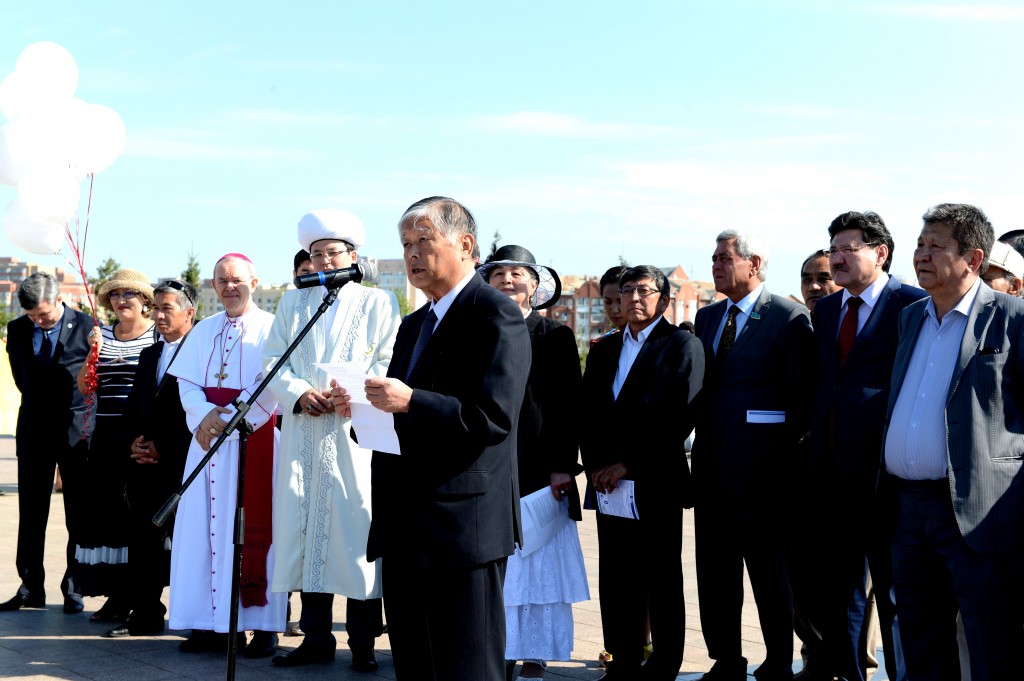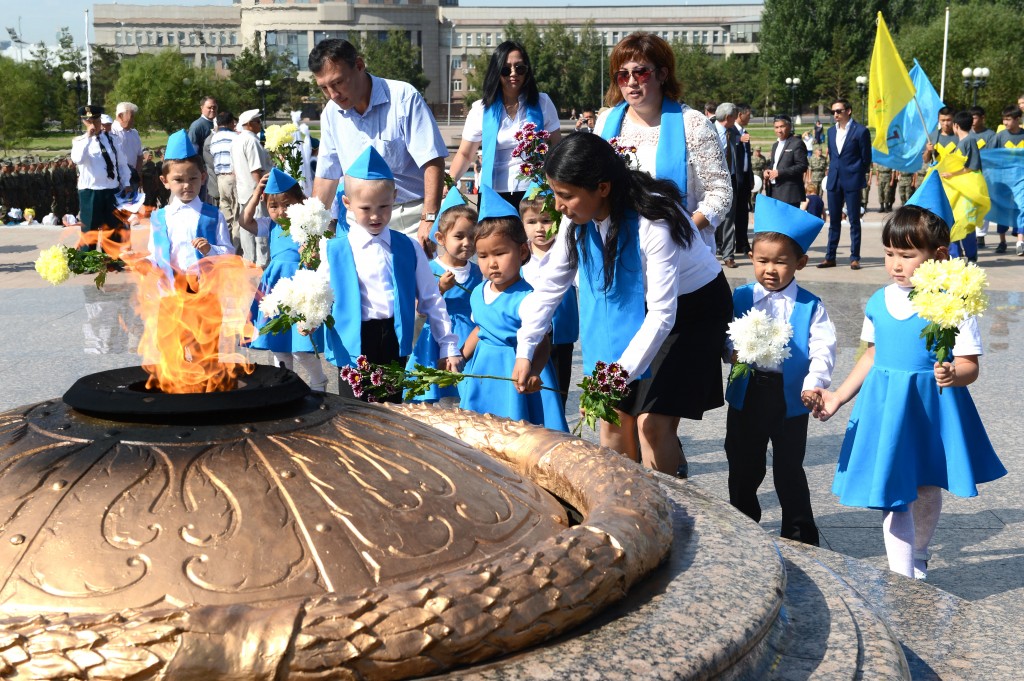ASTANA – The people of Kazakhstan shared the pain of millions of Japanese who perished in the Hiroshima and Nagasaki bombings on Aug. 6 and 9, 1945 in an Aug. 6 observanceat the capital’s Otan Ana Defenders of the Motherland monument. The dreadful nuclear explosions took nearly 130,000 Japanese lives.
“Today on Aug. 6, Hiroshima is hosting a ceremony to commemorate the victims of the tragic events of Aug. 6 and 9, 1945,” said one of the invited guest speakers, Japanese Ambassador in Kazakhstan Kamohara Masayoshi in his address. “The people of Japan are calling on the entire world not to repeat such tragedies. There are over 16,000 units of nuclear weapons in the world today; this number is more than enough to destroy the entire human race and that is extremely dangerous. Japan and Kazakhstan will jointly co-chair the conference to enforce the Comprehensive Nuclear-Test-Ban Treaty (CTBT) for two years starting September.”
The CTBT would ban all nuclear explosions in all environments for either military or civilian purposes. The treaty was adopted by the United Nations General Assembly in 1996 but it can only be enacted should eight specific countries – China, Egypt, India, Iran, Israel, North Korea, Pakistan and USA – both sign and ratify it. Although 183 states have signed the treaty and 164 ratified it, those nations have not yet followed suit.
According to the ambassador, Japan intends to play a “leading role in practical approaches of the international community in the [nuclear non-proliferation] area, including the soonest entry into force of the CTBT.” He added Japan and Kazakhstan are also tightly collaborating to achieve positive results at the Nuclear Security Summit that will take place in March 2016 in the United States.
“The civil society needs to undertake joint efforts and actions in order to realise the idea of a world free of nuclear weapons by showing the [nuclear] painful past to the new generations and I highly regard the International Day Against Nuclear Weapons (Aug. 29) and The ATOM Project created to raise awareness about nuclear weapons that were initiated by President Nursultan Nazarbayev,” said Masayoshi.
The ATOM Project was launched by Nazarbayev on Aug. 29, 2012 as a campaign to raise global awareness about the consequences of nuclear weapons explosions and testing. To date, the ATOM Project’s online petition has collected more than 160,000 signatures worldwide. The effort has been supported by global governmental and non-governmental organisations such as the Comprehensive Nuclear Test Ban Treaty Organisation (CTBTO), Organisation for the Prohibition of Chemical Weapons (OPWC), which was awarded the Nobel Peace Prize in 2013, Mayors for Peace and Bike for Peace among many others throughout the international community.
“Some 60,000 people died in the first hours of the explosion in Hiroshima and within the next few weeks the same number of people shared the same fate,” said Roman Vassilenko, chairman of the international information committee of the Kazakh Ministry of Foreign Affairs, representing The ATOM Project. “It is important to host such commemorative campaigns against nuclear weapons so people will remember the consequences of nuclear explosions, as the bombings are echoing further and further in history. Our President had numerous global initiatives against nuclear weapons and one of them was The ATOM Project, which serves as a platform to say ‘no’ to nuclear weapons testing and ultimately, nuclear weapons. We cannot feel safe and secure in the world from nuclear annihilation as long as nuclear weapons continue to exist and hang over our heads.”
Similar sentiments were voiced by Kazakh Senate (upper house of Parliament) member Vladimir Redkokashin.
“I would like to express my deepest condolences to the Japanese people. Kazakhstan is making great global efforts to help avoid the tragedies of Hiroshima and Nagasaki in the future. Our President is also making efforts to assure the peaceful use of nuclear energy and at his initiative the Semipalatinsk nuclear test site was shut down,” he said.
Head Coordinator of the Ak Orda Public Partnership non-governmental organisation Zoya Tyulebayeva read out an appeal to the people of the world on behalf of the gathering.
“The Semipalatinsk test site equalled the hundreds of tragedies in Hiroshima and Nagasaki, thousands of lost lives of our compatriots and an ecological catastrophe of our soil. During the active years of the Semipalatinsk test site, 459 nuclear explosions were carried out. We are asking to shut down the existing nuclear test sites and to stop nuclear tests. The 21st century must become the century of stability and security,” she said.
In addition to the representatives of the Japanese Embassy, the ceremony was attended by the Council of Veterans of Astana, Zhan Arystan Astana Experimental Group represented by children of the capital and youngsters from Sulu Ai kindergarten and Oner Educational and Creative Centre in Kosshy village, as well as veterans and students of the Astana Judo Federation.
The event ended with the children laying flowers at the eternal fire and releasing seven balloons and seven white doves into the air as a sign of peace on Earth.



